Apr 16, 2016 | News
UNESCO Chair Fellow Dr. Joseph Tham presented his reflection on “Natural Law and Global Bioethics” at the International Conference on Religions and Human Rights at the Human Rights Centre of the University of Padua on April 15, 2016. The introduction to Tham’s talk is found below. Click here to download a schedule of the event.
Natural Law and Global Bioethics
Fr. Joseph Tham, LC
Introduction
The challenges of ethical behaviors in a global village are more relevant than ever. Edmund Pellegrino once commented, “As the biosphere expands to embrace the whole globe, every nation has a stake in every other nation’s health. For these reasons, the practical and conceptual questions of transcultural biomedical ethics are more sharply defined than in some other domains of knowledge.”[1]
In different parts of the world, the practices of medical tourism, organ trafficking, selective abortion based on gender, and lack of individual informed consent are seen as violations of universal human rights by international standards. At the same time, many of these practices are economically driven because of the availability of relatively inexpensive medical services, body parts, or wombs-for-rent. Due to the general underdevelopment of local bioethical reflection in these parts of the world, it is not uncommon for academics and governing ethical bodies to adopt wholesale secularized bioethical principles.
At the same time, the attempt to catch up economically and technologically in developing countries such as China, India, or Brazil has however created certain unease. Technology and free market economics are not value-free. They often come with a worldview that champions liberalism, individualism, unfettered capitalism, scientism and a blind trust in technological solutions. Modernity is at the same time attractive to many developing countries and at odds with its traditional values.
Can an all-encompassing global bioethics offer a solution to these difficult questions? Others have raised the question of whether or not global ethics of universal human rights might not be neo-colonialism in disguise. For instance, certain Asian scholars claim that values based on traditions, familial relationships and religion which they claim are more compatible with local customs and superior to the Western rights-oriented individualism.[2]
How can the natural law tradition shed light on these challenges? The International Theological Commission document The Search for Universal Ethics: A New Look at Natural Law seeks to address the perennial problem of universality and particularism in ethics. It proposes rationality as the common ground to deduce the universal basis for human rights and dignity, thus avoiding the danger of consensus ethics prevalent in the secularized West on the one hand, and the danger of conflating multicultural and multi-religious settings with ethical relativism on the other.
The paper will finally look at the question of the incommensurability of ethical traditions with a look at the response of Alasdair MacIntyre. While shunning cultural relativism, he recommends mutual understanding of rival moral traditions through in-depth rational debates and encounters in order to arrive at the most valid moral system.
[1] Edmund Pellegrino, Patricia Mazzarella, and Pietro Corsi, eds, Transcultural Dimensions in Medical Ethics. (Frederick, MD: University Publishing Group, 1992), 14.
[2] See Hyakudai Sakamoto, “Towards a new global ethics,” Bioethics 13 (1999): 191–197; Widdows, Heather. “Is Global Ethics Neo-colonialism? An Investigation of the Issue in the Context of Bioethics,” Bioethics 21, no.6 (2007): 305-315.
Apr 5, 2016 | News
by Michael Baggot
On Monday April 4, the Department of Jurisprudence hosted a morning of study dedicated to “Neuroscience: Ethics and Law” at Libera Università Maria Ss. Assunta (LUMSA). The event featured presentations from both UNESCO Chair Director Alberto García and UNESCO Chair Fellow Alberto Carrara. A flyer of the event can be read here.
After the presentations, García moderated a round table discussion on Neuroscience between Rabbi Riccardo Di Segni, Chief Rabbi of the Hebrew community in Rome; Dr. Maria Angela Falà, President of Interreligious Dialogue of the Maitreya Foundation; Imam Yahya Sergio Yale Pallavicini, Director of Interreligious Dialogue for the Mosques of Rome.
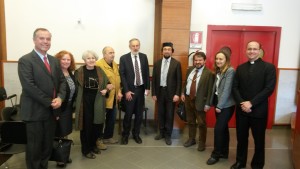 LUMSA Law Professor Laura Palazzani introduced the morning of study. Since 2002, Palazzani has served on Italy’s National Committee of Bioethics. She is currently the organization’s Vice-President.
LUMSA Law Professor Laura Palazzani introduced the morning of study. Since 2002, Palazzani has served on Italy’s National Committee of Bioethics. She is currently the organization’s Vice-President.
In December, García moderated an interreligious round table discussion on religious liberty with the same panel scheduled to meet again at the LUMSA. A summary of the stimulating dialogue and video footage of the exchange can be found online here.
Those interested in learning more about the UNESCO Chair’s commitment to exploring the world’s most relevant bioethical issues from a multicultural and interreligious perspective are welcome to read more about the upcoming workshop on “Bioethical Challenges in Neurogenomics from an Interreligious and Multicultural Perspective” November 14-16 at Houston’s renowned MD Anderson Cancer Center.
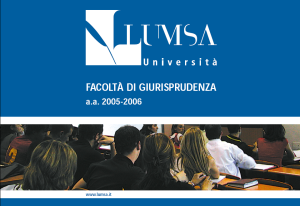
Feb 6, 2016 | News
UNESCO Chair Director Alberto Garcia recently participated in a round table on the theme “Relationship between Religion and Bioethics” as part of the “Festival of Life” in Caserta, Italy. A full program of the event can be seen here.
Garcia explained that the relationship is a necessary one that should be fostered through fraternal relationships. These relationships in turn enable a more effective collaboration in international organizations.
These relationships among practitioners of diverse religious backgrounds is especially important in the field of bioethics. Scientific and biotechnological developments frequently touch upon themes of human rights dear to various religious traditions. These different religious traditions also tend to prize a compressive worldview that harmonizes truths of science, reason, and faith. Interdisciplinary studies also provide the needed space to collaborate in finding solutions to complex situations.
The UNESCO Chair of Bioethics and Human Rights, based in the Pontifical Athenaeum Regina Apostolorum and the European University of Rome was one of the festival’s sponsors. Regina Apostolorum also sponsored the Italian event. Garcia is a member of the festival’s Advisory Board.
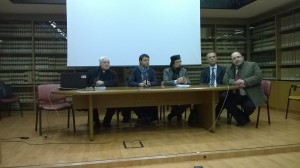
Dec 4, 2015 | News
During three days our UNESCO Chair workshop will analyse and discuss “Bioethical Challenges in Neurogenomics from an Interreligious and Multicultural Perspective”. Previous workshops have successfully taken place in Jerusalem, Rome, Hong Kong and Mexico with the participation of more than 70 prestigious interdisciplinary scholars from around the world, including Houston.
Ours is the world’s foremost multicultural and interreligious academic bioethics conference and provides important benefits for the experts and institutions in the field of bioethics. It provides a media platform promoting recognition and visibility of the academic and scientific commitment in the field of life sciences and medicine. It highlights their capacity for dialogue and understanding in our challenging globalized and diverse world. Furthermore the participants’ scholarly contributions are gathered and published in the workshop proceedings, the first having being “Religious Perspectives on Human Vulnerability” (Springer 2014).
We have chosen Houston for these conferences because it is an advanced and prestigious scientific, medical and university city. Its multicultural and diverse population makes this location attractive for experts in the field. The topics to be addressed will capture the attention and interest of health professionals, university scholars, the scientific community, researchers, media, politicians and the general public.
Experts who are invited to participate receive no payment for their scientific contribution, however we cover their travel expenses, lodging and meals. The participants will also be invited to view the winning works of art from our Bioethics Art Competition.
We are confident that this next major UNESCO Chair endeavour gathering twenty-five experts in bioethics and other related disciplines from seven major cultural and religious traditions will be an attractive undertaking for your prestigious institution. Through your contribution as an expert you will help to foster conversation and understanding among peoples from our globalized and religiously diverse world so in need of peace.
Four international conferences and workshops on “Bioethics, Multiculturalism and Religion” have been held in Jerusalem (2009), Rome (2011), Hong Kong (2013), Mexico City (2014). These academic conferences sought to foster the art of convergence and cooperation in global ethics among experts in bioethics coming from the world religions including Buddhism, Christianity, Confucianism, Hinduism, Islam, and Judaism.
Hosted by the UNESCO Chair in Bioethics and Human Rights, established in two Roman universities, the Università Europea di Roma and Ateneo Pontificio Regina Apostolorum, the conferences are a first step in creating a permanent academic forum to promote dialogue and bioethical reflection in the light of human rights and duties addressed from different religious and cultural perspectives in the worlds actively-advancing medical, legal and technological environment.
By gathering experts from these religions, a rare space for dialogue has been created where an atmosphere of friendship and respect reigns. Such dialogue and encounters allow us to see the other as our brothers and sisters in our common humanity. This is most urgent in our globalized reality, and can eliminate suspicions that are sometimes causes of distrust and even violence.
Our experiences enable us to share values and attitudes that facilitate dialogue and the accomplishment of UNESCO Chair goal of “Fostering the Art of Convergence and Cooperation in Global Ethics”. The Chair seeks to create a forum for diverse bioethics thought leaders. Collaborating in a spirit of respect and friendship we hope to deliver a common framework to guide the application of bioethical principles in the light of the UNESCO Declaration on Bioethics and Human Rights. In this manner we can inform and enlighten ethical, legal and public opinions, decisions, and actions relative to medicine, life sciences and human rights and responsibilities.
The meeting in Houston 2016 will consist of a three-day workshop in which bioethics experts from Buddhism, Christianity, Confucianism, Daoism, Hinduism, Islam, and Judaism will gather to discuss different papers submitted for this occasion. The collection of these papers will result in the publication of a book.
The general theme for this workshop will be “Bioethical Challenges in Neurogenomics from an Interreligious and Multicultural Perspective” and has been chosen by the experts participating in our previous workshop (Mexico 2014) according to our common practice. To find convergence and cooperation in the field of these emerging technologies will be the core subject matter of the papers and workshop discussions and lectures.
Houston 2016 Workshop: Significance & Innovation
The rapid evolution of neuroscience and the science of genetics triggers exponential rather than linear growth in bioethical challenges. Additionally growing globalization-influenced pluralism among patients and medical professionals complicates bioethical responses able to be understood as normative within and across these different groups.
The 2016 Houston workshop and conference under the auspices of the UNESCO Chair in Bioethics and Human Rights serves as the world’s foremost multicultural and interreligious academic bioethics conference. It is uniquely poised from this perspective to analyze bioethical challenges arising at the interface of neuroscience and genetics and the patient-provider relationship.
At the intersection of neurobiology and genome science, neurogenomics is the study of how the genome as a whole contributes to the evolution, development, structure, function and disease of the nervous system (Nat Neurosci 2004 May; 7, 5: 429-33), providing “new clues on the understanding of neurodegenerative diseases by identifying common molecular pathways in neurodegeneration and cell type-specific gene expression patterns that may underscore selective susceptibility of specific neurons in disease”.
Neurogenomics is presently at a very exciting crossroad since recent discoveries have challenged the classic model of gene organization and information flow, and for these reasons are improving our self-understanding by providing biological descriptions of how man acts. However the bioethical imperative remains to articulate how man should act within the relevant phenomenological dimensions described from the rich blend of multi-cultural and inter-religious dialogue.
Paper guidelines
Recognized thought leaders from diverse religions and cultures will be invited to analyze, write a paper and discuss about these bioethical questions and their anthropological implications:
- using their religious and/or cultural authoritative texts and belief sources;
- organized around the workshop´s featured key questions
- within the global bioethics paradigm of human rights and duties, articulated by the Universal Declaration of Human Rights (1948) and the UNESCO Declaration on Bioethics and Human Rights (2005).
- engaging questions concerning potential bridge concepts as well as ‘problematic’ dissimilarities with suggestions on how they might be managed to keep the conversation focused with the aim of fostering convergence and cooperation
Key questions to be adressed by the papers
- How does my cultural tradition take into account genetics and epigenetics? What is the understanding of neuroscientific developments?
- Can genetic and brain interventions, drugs, and devices beyond therapeutic use be applied that might alter a patient’s personality, identity, and/or behaviors?
- Are genes and the brain taken into account in order to explain human nature and behavior better? Why or why not?
- What is the relationship between DNA, brain, mind, and soul?
- How can genetic and neuroscientific research and their clinical applications be cultivated to benefit developing countries?
“Advances in genomics is accelerating the pace of discovery in all areas of biology and medicine including psychiatry. Neuroscientists are now inundated with information implicating hundreds of regions across the genome that harbor rare and common risk variants for disorders of the brain” (Nature Neuroscience, June 2014, Volume 17, No. 6, pp. 745-889).
Many questions and doubts arise in the philosophical contemplation of the intersection of human meaning, genetics and neuroscience. We want to reflect upon these emerging anthropological and bioethical issues from the perspective of our cultures and religions.
Workshop Methodology
The following papers will be commissioned:
- One expert from each of the seven religious groups will write and present a paper (approx. ten pages) that must be submitted three months before the workshop addressing some specific aspects of the topic that will be pointed out by our Scientific Committee.
- A second expert of the same tradition will be assigned to respond to the above paper (approx. 4-5 pages) and submit it before the workshop.
- A third expert from a different tradition will be assigned to respond to the above paper (approx. 4-5 pages) and submit it before the workshop.
- The language of the workshop is English. Participants of the workshop include:
a) Experts from the various religions who have written and submitted the papers. They are expected to have read the other papers before attending the workshop. During each workshop session, they will give a 15-minutes summary of their papers followed by the two eight minutes critiques and an ample period of discussion, clarification, and questions from other authors.
b) Academics interested in the workshop may also participate in the sessions, after approval by the organizing committee (send requests to jtham@unescobiochair.org). They can raise questions only after the group above has completed its discussions.
- Before submission for eventual publication, the participants may modify their papers in light of the dialogue of our three-day meeting.
It is hoped that these discussions will provide a clear and thorough understanding of each religious tradition´s understanding of the bioethical topic we in the light of human rights.
Public conference
As means of publicity and involvement of multiple and diverse scientific, medical and university communities and the public we propose to organize during the week in Houston an event open to the public on topics related to bioethics issues in the light of human rights in a multicultural and multireligious environment.
In this event, experts in the workshop will provide academic lectures or presentations for educational purposes on bioethics and human rights. We will encourage participation of the outside community including public authorities, doctors and other healthcare personnel, patients, teachers, university scholars and students, and anyone interested in these relevant topics. The workshop and conference are primarily academic and apolitical, even though we encourage participation of all.
Co-organizers
- UNESCO Chair in Bioethics and Human Rights
We are proud to have several Houston scholars involved in the workshops and several prestigious Texas institutions interested in participating, co-organizing and/or sponsoring these scientific and cultural events:
- Baylor College of Medicine
- Institute for Spirituality and Health
- Rice University
- The University of Texas, McGovern Center for Humanities and Ethics
- The University of Texas MD Anderson Cancer Center
- University of Houston
- University of St. Thomas
Organizing committee
Alberto Garcia, UNESCO Chair in Bioethics and Human Rights, Rome
Joseph Tham, LC, UNESCO Chair
Gonzalo Miranda, LC, UNESCO Chair
Colleen Gallagher, MD Anderson Cancer Center, Houston
John Lunstroth, University of Houston
Chris Durante, St. John´s University, NYC
Coordinator: Alberto Garcia agarcia@unescobiochair.org
Dec 1, 2015 | News
by Michael Baggot
View highlights of the event below:
View the afternoon session that began with the round table discussion:
How do your sacred texts view religious liberty? What convergences and divergences do you find between your religion and the text Dignitatis Humanae? What are the chief obstacles to interreligious dialogue? What would you say to those who use violence in the name of religion?
These provocative questions guided the December 10th round table discussion between Rabbi Riccardo Di Segni, Chief Rabbi of the Hebrew community in Rome; Dr. Maria Angela Falà, President of Interreligious Dialogue of the Maitreya Foundation; Imam Yahya Sergio Yale Pallavicini, Director of Interreligious Dialogue for the Mosques of Rome.
UNESCO Chair Director Alberto Garcia moderated the conversation as part of the day of study “Dignitatis Humanae and Religious Liberty” held at the Pontifical Athenaeum Regina Apostolorum and the European University of Rome to commemorate the 50th anniversary of the closing of the Second Vatican Council which promulgated one of the most influential documents of contemporary interreligious dialogue.
The Library Pius XII and the UNESCO Chair in Bioethics and Human Rights organized the day of study in collaboration with the Institute for Social Doctrine and Information and the Association of World Culture.
Alberto Garcia speaks to Telepace about the event. See minutes 1:20-1:45 and 10:15-12:45:
How do your sacred texts view religious liberty?
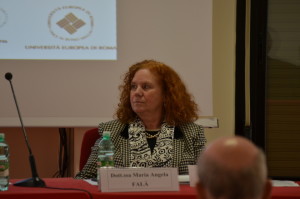
Falà noted that the scriptures of Buddhism did not contemplate religious liberty, as understood today. The contemporary notion of religious liberty was born in Europe. Traditionally, an ethics of duty and respect for the other has characterized Buddhism, instead of a vision focused on rights. However, Buddhism has long encouraged individuals to respond to other communities with respect, not violence. There are thus aspects of the Buddhist tradition, particularly the 10 social actions, which open the religion to embrace some of form of religious liberty.
Di Segni likewise noted that the scriptures of his Jewish tradition do not contemplate the modern notion of rights. In fact, certain passages of the Hebrew Bible seem to negate religious diversity. For instance, Deuteronomy chapter 7 contains exhortations to destroy the temples, statues, and other revered objects of neighboring religions. In general, the Hebrew Bible speaks more of duties than of rights. Many sections emphasize the chosen people’s call to acquire and maintain a territory in which laws should imposed. A possible connection between the Hebraic scriptural tradition and contemporary human rights comes in the concept of a Noahic covenant with seven fundamental principles to which all men are expected to observe.
Pallavicini first insisted that it is necessary to appreciate the context of Koranic revelation. He noted that it was addressed to a minority seeking truth and a pure worship. The message of Koran was sent to overcome an age of ignorance marked by the “sin of association,” that is to say, contact with idols. Various Arab tribes had occupied the land and sought to affirm their idolatry. In this tribal context, the Koran exhorts the renewal of the worship of pure monotheism exemplified in Abraham. Religious liberty is thus seen primarily in contrast with idolatry. Second, Pallavicini spoke on the history of prophecy in which many, but not all, of the various spokesman of God are mentioned. The Koran shows special reverence towards Muslims, Jews, and Christians as “People of the Book.” Moreover, it respects the wise men not explicitly mentioned, such as great Buddhists, Hindus, and Taoists. Third, Pallavicini highlighted the current period of decadence in Islamic culture. There are a scarcity of authentic teachers, while there are many formalists obsessed with politically ideological interpretations of the Koran. Finally, we must honestly confront the Koranic texts that harshly criticize other religions.
What convergences and divergences do you find between your religion and the text Dignitatis Humanae?
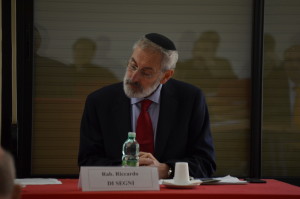
Di Segni noted that he and other Jews still find the conciliar document’s affirmation of Christianity as the one and true religion an obvious point of contention in their dialogue. However, his religious community generally agrees with the same document when it adopts human rights language akin to that found in international constitutions.
Falà shared that for Buddhism, the major point of contention is the problem of truth. When speaking of truth, a Buddhist will be inclined to ask “Which truth?” Falà clarified that in Buddhism, Truth (with a capital “T”) does not exist. The tradition can thus speak of orthopraxis, but not orthodoxy.
Pallavicini similarly chided Dignitatis Humanae for its exclusivism, that is, the Catholic Church’s refusal to allow for the possibility of other ways to absolute truth. This vision produces the danger of viewing one supreme religion over and above other secondary religions. Nonetheless, the Islamic community would be generally favorable to the Catholic document’s warning against aggressive secularism.
What are the chief obstacles to interreligious dialogue?
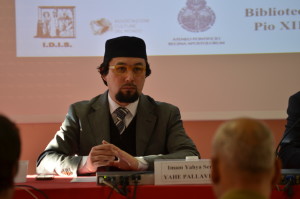
Falà recalled that interreligious dialogue is created by doing it. However, this dialogue should not be reserved to formal gatherings, but should rather enter the marketplace and daily life. Formal encounters are not enough, since they can leave without authentic appreciation for the other.
Pallavicini explained that ignorance, fundamentalism, and violence constantly threaten interreligious dialogue. We need individuals who have studied and lived their religion to combat ignorance. There is the danger of viewing oneself as the ruler of truth. His experience has shown Pallavicini that interreligious dialogue can aid intrareligious dialogue that seeks to purify a particular tradition of the three threats previously alluded to.
Di Segni urged the audience to keep in mind the goal of interreligious dialogue. He encouraged the path of mutual understanding and warned against the path of conquest of the other.
What would you say to those who use violence in the name of religion?
Di Segni explained the feast of Hanukah as a celebration of religious liberty against Hellenism. He noted that in an event with a long military conflict, his religious tradition has not emphasized the battles, but rather a peaceful miracle of candles. He insisted that exaggerated fundamentalism profanes authentic religion.
Falà reminded the audience that religion should be essentially a search for truth, unity, and ethics. It should educate in fundamental values, not separate. While violent Muslims gain most attention in the western media, she admitted that practitioners of Buddhism are not exempt from the shamefully violent acts.
Pallavicini observed that God’s name manifests his presence. Terrorism committed in his name is therefore a form of blasphemy. The invocation of his name should contribute to peace and contemplation, not bloodshed. Muslims are actually the largest group of victims of Islamic terrorism, thus presenting a horrid fratricide to the world. Pallavicini also encouraged attentiveness to the pretexts of dialogue. Unfortunately, some use what they call dialogue to legitimize their pet ideologies. Some even hold dialogue with particular groups as a platform for wagging ideological war against outsiders.
The panelists expressed their sincere desire that their stimulating encounter mark the first of many meetings to form a culture of mutual understanding and constructive cooperation among members of different religions in a world too often tarnished by ideological violence.
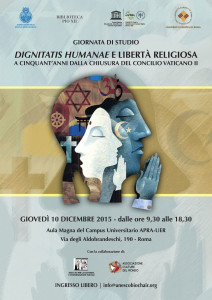
Read the full program here.
View the morning session:







